biotechrabbit™ cDNA Synthesis Kit provides superior components that ensure efficient first-strand cDNA synthesis from mRNA or total RNA templates. biotechrabbit RevertUP™ II Reverse Transcriptase enables highly efficient reverse transcription with increased thermostability.
biotechrabbit RNase Inhibitor is a potent non-competitive inhibitor of RNases. The combination of highly efficient cDNA synthesis, effective RNase inhibition and pure dNTPs allows high yields of cDNAs of more than 19 kb.
For greater application flexibility, hexamer primers, allowing all RNAs in the reaction to be used as templates, and an oligo (dT) primer, for the synthesis of cDNA from only poly(A) tailed mRNA, are included.
Component | Composition |
RevertUP II Reverse Transcriptase | RevertUP II Reverse Transcriptase, 200 U/µl in Storage buffer, containing 50% glycerol |
5× cDNA Synthesis Buffer | Optimized 5× cDNA synthesis buffer |
dNTP Mix (10 mM each) | Aqueous solution (pH 7.0) containing 10 mM each: dATP, dCTP, dGTP, dTTP sodium salts |
RNase Inhibitor | RNase Inhibitor, 40 U/µl, in Storage buffer, containing 50% glycerol |
Hexamer Primer | 25 µM Random Hexamer Primer |
Oligo (dT) Primer | 10 µM Oligo (dT) Primer |
PCR Grade Water | Ultrapure, sterile filtrated water, DNase-, RNase- and protease-free |
STORAGE | -20°C (until expiry date – see product label) |
Quality Control
Functional Assay
cDNA synthesis with specific primers, followed by quantitative PCR.
Prevention of cDNA synthesis reaction contamination
RNase contamination is an exceptional concern when working with RNA. RNase A, providing most threat to RNA integrity, is a highly stable contaminant of any laboratory. To prevent RNA from degradation and to minimize possibility of contamination during cDNA synthesis; follow the guidelines below:
- Use separate clean areas for preparation of the samples and the reaction mixture.
- DEPC-treat all tubes and pipette tips or use certified nuclease-free labware with aerosol filters.
- Wear fresh gloves when handling RNA and all reagents.
- Always assess the integrity of RNA prior to cDNA synthesis in denaturing agarose gel electrophoresis.
- Use RNase free water and other reagents.
- To prevent RNA from degradation, add Ribonuclease inhibitor (optional) in to the cDNA synthesis reaction (20 units for 20 µl reaction).
Typical cDNA synthesis reaction set up
- Thaw on ice and mix very well all reagents.
- Assemble and keep all reactions on ice.
- To use time and reagents effectively, always prepare master mix for multiple reactions. For a master mix volume, always calculate the number reactions that you need plus one additional.
- Combine the following in an RNase-free reaction tube:
Component | Volume | Final concentration |
dNTP Mix (10 mM each) | 2 µl | 1 mM (each dNTP) |
RNase Inhibitor, 40 U/µl (optional) | 0.5 µl | 1 U/µl |
Oligo (dT)12–18 (10 µM) – or Hexamer Primer (25 µM) – or Gene Specific Primer (10 µM) | 0.5 µl 1 µl 0.5 µl | 0.25 µM 1.25 µM 0.25 µM |
5× cDNA Synthesis Buffer | 4 µl | 1× |
RNA Template | 0.1–1 µg total RNA or 50–500 ng mRNA (polyA) |
|
RevertUP™ II Reverse Transcriptase | 1 µl | 10 U/µl |
PCR Grade Water | Variable |
|
Total volume | 20 µl |
|
- Mix and collect the drops by centrifuging briefly.
- When using
- Hexamer Primer, incubate 10 minutes at 30°C followed by 50–55°C for 20–60 minutes
- Oligo (dT) or gene-specific Primer incubate at 50–55°C for 20–60 minutes.
- Inactivate enzyme at 99°C for 5 minutes.
- Collect the drops by spinning briefly.
- Store products at –20°C or proceed to next step, like PCR or qPCR.
- Use maximum 10 µl of the cDNA synthesis reaction mix for PCR in 50 µl volume.
You may also be interested in the following product(s)
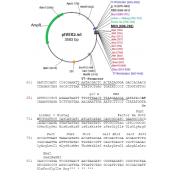
RTS pIVEX E. coli His-tag, 2nd Gen. Vector Set
Package Sizes |
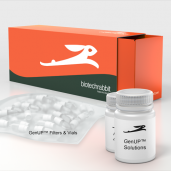
GenUP™ Blood RNA Kit
Package Sizes |
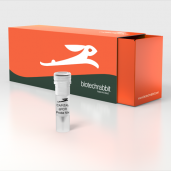
4X CAPITAL™ qPCR Probe Master Mix
Package Sizes |
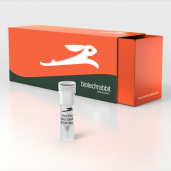
2X YourTaq™ Hot-Start PCR Master Mix
Package Sizes |
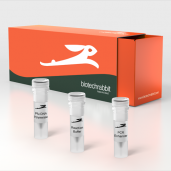
Pfu DNA Polymerase, 2.5 U/µl
Package Sizes |
